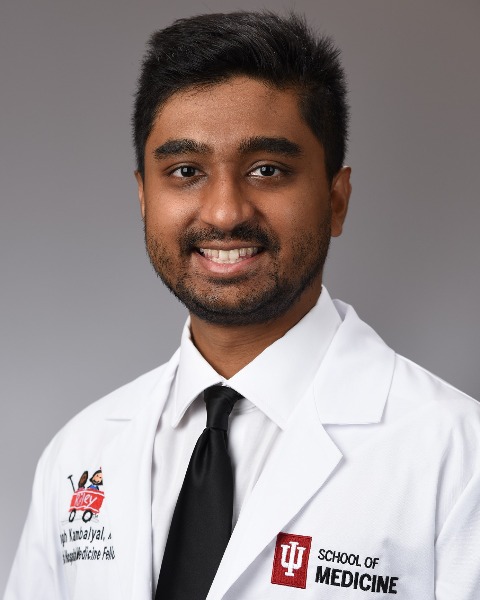Immunizations/Delivery
Session: Immunizations/Delivery Works in Progress
WIP 129 - Improving Tdap and Influenza Vaccines Rates for Family Members and Close Contacts of Patients admitted to a Children’s Hospital: A Quality-Improvement Initiative
Saturday, May 4, 2024
3:30 PM - 6:00 PM ET
Poster Number: WIP 129
Publication Number: WIP 129.957
Publication Number: WIP 129.957

Amogh Kambalyal, MD (he/him/his)
Pediatric Hospital Medicine fellow
Indiana University School of Medicine/ Riley Hospital for Children
Indianapolis, Indiana, United States
WIP Presenting Author(s)
Background: Children are a unique population where many patients are too young to receive certain vaccines. They rely on close contacts to be up to date with their own vaccines to provide herd immunity, a concept known as "Cocooning.” Many quality improvement initiatives use hospitalization as an opportunity to update patients on their vaccines, however, none focus on vaccinating family members/caretakers. For this project, we aim to institute standardized interventions to increase vaccine rates at our institution and evaluate the importance of having a vaccine delivery method for these subjects on a national scale.
Objective: Our primary objective is to double the number of influenza and Tdap vaccines administered during the 2023-2024 viral season compared to the previous season.
Design/Methods: Our QI project will include a Plan-Do-Study-Act method to implement interventions that will lead to an increased administration of influenza and Tdap vaccines for family and close contacts. IRB approval was already achieved in August 2023, with Exempt status. Surveys were subsequently sent to other children’s hospitals via two listservs: Children’s Hospital Association (CHA) and Pediatric Research in Inpatient Settings (PRIS), to gather national data on various strategies and barriers encountered with family vaccines. Our first intervention has started (October 2023) and includes an EMR “Message to Nursing" order incorporated into the General Admissions order set. We have also started conducting educational sessions for hospital staff to familiarize them with the order. Our second intervention will begin December 2023, when we implement a “Vaccine Rover” strategy, where a dedicated healthcare professional will obtain consents and administer vaccines by going to individual patient rooms. Paper consents will be completed by the family member before vaccine administration. The consents will be totaled monthly and compared to the date of initiation of an intervention. Data collection will end March 1, 2024. Data analysis will be complete by April 1, 2024, with the aid of a biostatistician.
